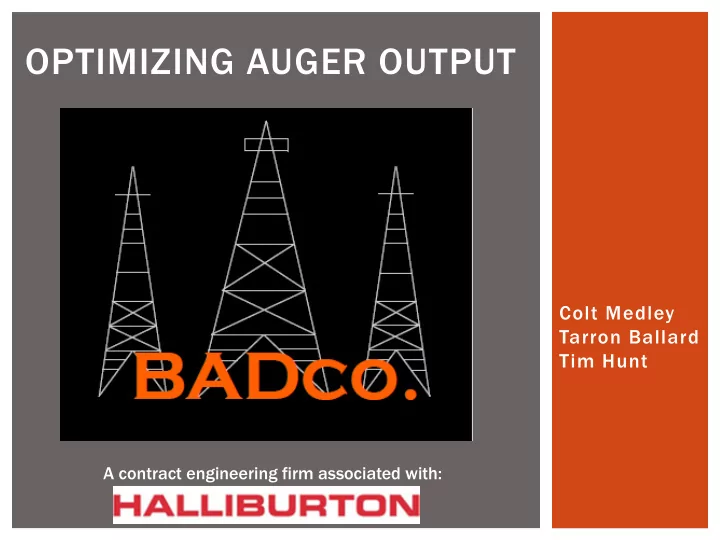

OPTIMIZING AUGER OUTPUT Colt Medley Tarron Ballard Tim Hunt A contract engineering firm associated with:
MEET THE TEAM Tarron Ballard Tim Hunt Colt Medley
PROJECT BACKGROUND
COMPANY BACKGROUND Founded in 1919 by Erle P. Halliburton in Duncan, OK. Employs over 70,000 workers in about 80 countries. Supports upstream oil and gas industry in many ways Managing geological data Drilling and formation evaluation Well construction and completion Optimizing production throughout the life of the well
HYDRAULIC FRACTURING Process first used in 1947 on Hugoton natural gas field in Kansas. Water and sand are forced into a rock formation to create tiny fractures that allow gas or oil to escape. Process takes 3 to 10 days to complete. Around 19,000 wells were fracked last year.
Halliburton Fracturing Job Site
FB4K BLENDER Each unit costs $1M to produce. Each screw conveyor costs around $20K. Proppant costs $1.50 to $7.00 per pound. Each job takes from 250,000 to 1,000,000 pounds of proppant. Average lifetime of each screw is 15 years. FB4K Blender:
PROJECT OUTLINE Project Proposal Details : Screw conveyors are used to meter proppant into the mixing tub on the FB4K. Over a certain speed, the output is not linear. We will optimize the design to increase the linear output operating range.
OBJECTIVES To improve the accuracy and output of the FB4K Blender’s sand screws by: 1. Deriving an equation that describes output. 2. Propose designs to improve overall output. 3. Build and test prototype of the accepted designs. 4. Derive an equation that describes the newly designed auger’s output.
DEVELOPMENT OF DESIGN CONCEPTS
CONTROL DESIGN One 6” diameter, 11’ long auger, 4” - 6” pitch Standard bin Operates at a 45 degree angle
LARGER BIN Not completely filling up bin Proppant doesn’t have time to surround screw completely at high RPM Increased volume from 244 in 3 to 382 in 3
REMOVAL OF TUBE EXTENSION Vertical angle may allow gravity to pull proppant away from tube Auger housing extends into the hopper, limiting availability of proppant
PROTOTYPE TESTING
PROTOTYPE We received an old conveyor from Halliburton to use for testing. The hopper, conveyor stand, and sack stand were fabricated in the BAE Lab.
TEST SETUP
TEST RUN
TEST RESULTS
DATA COLLECTION Test data was taken from each design at intervals of 100 RPMs from 200 to 700 RPMS. Each speed was tested three times.
CURRENT DESIGN One 6” diameter, 11’ long auger, 4” - 6” pitch Halliburton test data:
RESULTS Control test showed a decline in output at 600 RPM
RESULTS The larger bin showed data similar to the control test
RESULTS Test without the tube in the hopper were similar to the control test data.
TESTING FAILURE Supersack ripped during final tests and tipped over the auger.
RESULTS
TABLECURVE Data from Halliburton’s 12” auger testing Slope stays positive, but keeps decreasing at high RPMs.
TABLECURVE Control test data: y=-148.6+3.17x-0.0017x 2
TABLECURVE Enlarged bin data: y=-66.95+2.61-0.001x 2
TABLECURVE Removed Tube data: y=-321.63+4.33x-0.0036x 2
CONCLUDING REMARKS
BUDGET Halliburton offered us a budget of $5000-$10,000. Estimated costs were $3000. Actual budget covered all expenses besides auger and sand sent from Halliburton: Payee Payment McMaster-Carr $686.73 Stillwater Steel & Welding $660.60 Napa Auto Parts $380.87 BEI Sensors $507.00 Brewer Carpet One $79.20 Total: $2,314.40
SCHEDULE
CONCLUSION Our deliverables have been achieved for both semesters. Data was collected outside of the linear range for multiple design prototypes. We recommend that Halliburton explore changed in flighting. A concave flighting design or a lip on the edge of the flighting might account for the centrifugal force on the sand.
ACKNOWLEDGEMENTS We would like to especially thank the following people for their contributions to our effort: Paul Weckler Carol Jones Wayne Kiner Jason Walker Aaron Franzien Chad Fisher Wesley Warren Randy Taylor Sarah Powers Jana Moore Jannice Hicks
WORKS CITED Personal Conversations. Carol Jones. Stillwater, OK. 6 September 2012. Personal Conversations. Chad Fisher. Duncan, OK. 20 Septmber 2012. Personal Conversations. James Hardin. Stillwater, OK. 20 September 2012. Personal Conversations. Paul Weckler. Stillwater, OK. 4 September 2012. Personal Conversations. Wayne Kiner. Stillwater, OK. 27 September 2012. Personal Conversations. Wesley Warren. Duncan, OK. 20 September 2012 . Powers, Sarah J. BADco. Logo. 2 Sept. 2012. Oklahoma State University, Stillwater, OK. SolidWorks 2012. Computer software. Concord, MA: Solidworks, 2012. SYSTAT Software Inc. (2002). Table Curve 2D (software). Richmond, CA . "UltraFlyte - Auger Flighting." Cadorath. 26 Nov. 2012 <http://www.cadorath.com/cadorath-uniflyte-ultraflyte.html>. Halliburton Web Page http://www.halliburton.com/public/projects/pubsdata/hydraulic_fracturing /fracturing_101.html
QUESTIONS?
Recommend
More recommend